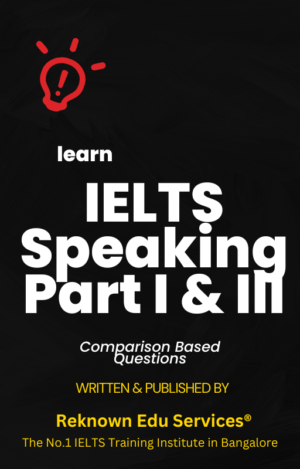Description
IELTS Speaking part II – Comparison Based Questions (Made for 2025)
In IELTS Speaking Part 2, comparison-based questions are designed to assess your ability to compare and contrast two or more things, such as people, places, objects, or experiences. These questions require you to analyze and discuss the similarities and differences between the given elements. By effectively addressing these questions, you can showcase your analytical skills and demonstrate your ability to express your thoughts in a coherent and organized manner.
When responding to comparison-based questions, it is crucial to provide a clear and concise introduction that states the two or more things being compared. For example, you might say, “I would like to compare two cities I have visited: London and Paris.” This introduction sets the context for your response and allows the examiner to understand the focus of your comparison.
Example: Comparison Based Question
Next, it is important to identify and discuss the similarities between the two elements. Using appropriate linking words such as “similarly,” “likewise,” or “in the same way,” you can effectively convey these similarities. For instance, you could say, “Both London and Paris are renowned for their rich history and iconic landmarks. Additionally, they offer vibrant cultural scenes with a wide range of museums, art galleries, and theaters.”
Linking words – IELTS Speaking Part II – Comparison Based Questions
After highlighting the similarities, it is crucial to address the differences between the elements. Linking words like “however,” “on the other hand,” or “in contrast” can help you smoothly transition into discussing the differences. For example, you could state, “Despite their similarities, London and Paris differ in terms of their architectural styles. London features a mix of modern and historical buildings, while Paris is famous for its distinctively elegant Haussmannian architecture.”
To support your comparisons, provide specific examples or evidence. This could include personal experiences, observations, or facts about the two elements being compared. For instance, you could mention, “During my visit to London, I had the opportunity to explore iconic landmarks such as the Tower of London and Buckingham Palace. In contrast, my time in Paris was highlighted by visits to the Eiffel Tower and the Louvre Museum, which houses famous masterpieces like the Mona Lisa.”
To ensure a coherent and well-structured response, make use of appropriate comparative language throughout your answer. This can include adjectives such as “bigger,” “smaller,” “more/less,” or adverbs such as “similarly,” “differently,” “more/less,” to express the degree of comparison between the elements. Furthermore, employ linking words and phrases such as “in comparison,” “by contrast,” “while,” “on the contrary,” to create smooth transitions between ideas and establish logical connections.
Conclusion: Comparison Based Questions
By practicing these strategies, you can confidently respond to comparison-based questions in IELTS Speaking Part 2. Remember to focus on delivering your ideas clearly, using a range of vocabulary and grammatical structures. With proper preparation and thoughtful responses, you can maximize your score and demonstrate your proficiency in English language skills.






Reviews
There are no reviews yet.